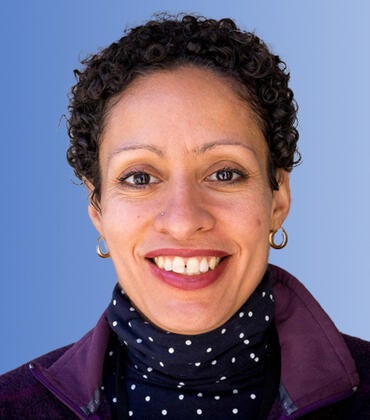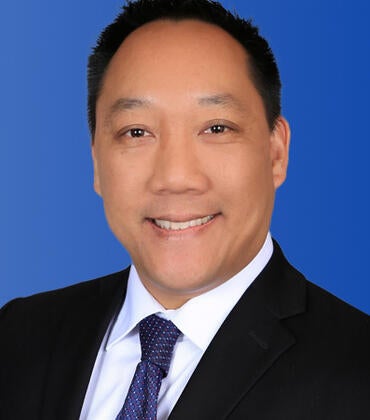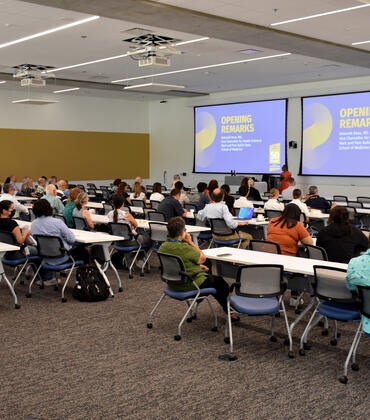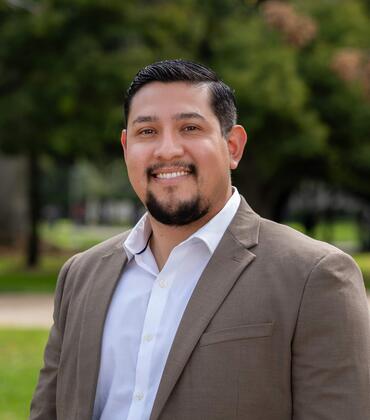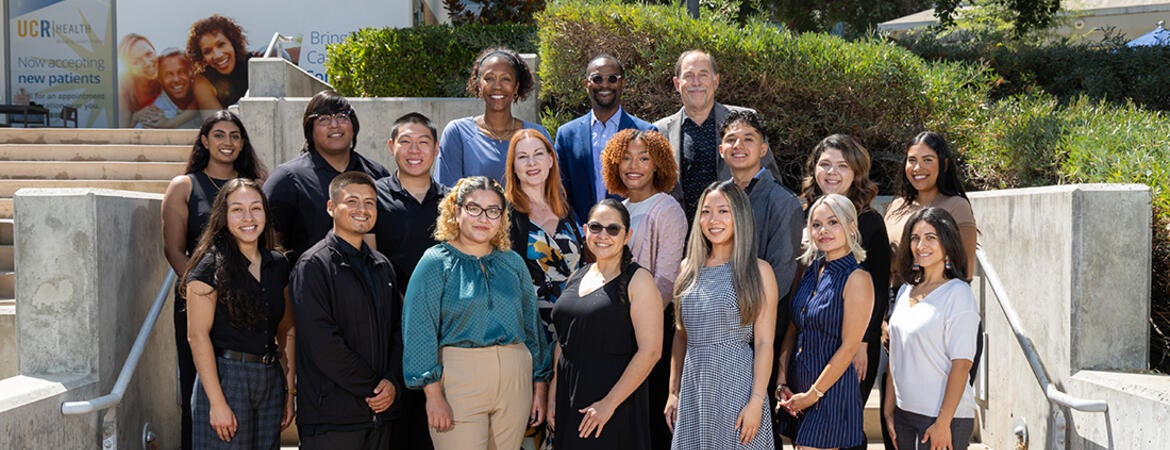
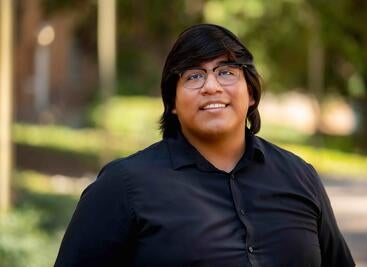
As a local community activist, Jorge Delos Santos, director of Community Health Programs at Riverside-based nonprofit TruEvolution, heard rumors about a new master of public health (MPH) program at the UC Riverside School of Medicine. Yet despite his interest and qualifications, Delos Santos initially lacked the confidence to apply when the program was announced in early 2024.
After receiving encouragement from a variety of people he had worked with at UCR in the Center for Healthy Communities, School of Medicine, Chicano Student Programs, and LGBT Resource Center, Delos Santos submitted his application. "It made the process easier because I had a village behind me helping me apply," he recalled.
The MPH program's holistic admission process, which considers applicants' unique experiences in addition to traditional academic metrics, also helped convince Delos Santos. “I think honestly, if UCR wouldn't have released an MPH program, [with] my imposter syndrome…I don't think I would have applied anywhere,” he explained. “I would have been convinced that I wasn't, quote unquote, good enough, smart enough.” Delos Santos' acceptance into the program’s first cohort, he said, banished his self doubt while renewing his motivation to fight for community health.
A new region-focused program
In fact, Delos Santos was a perfect fit for the SOM’s new MPH program, with its primary emphasis on promoting health equity in the local region. In fall 2024, he joined the first cohort of 15 total students, of whom 80% are residents of Inland Southern California, 40% completed their bachelor’s degree at UCR, and 67% are first-generation college students.
“Public health doesn't just address a health concern,” said Delos Santos of his experience working in the field. “When you boil it down, public health is really addressing the individual's health, but then seeing how an individual's health is impacted by social [issues], so you're also addressing a bigger social problem.”
Delos Santos has observed some of these issues firsthand. “Resources in our region are really scarce,” he said. “We have TruEvolution clients that take four or five hour bus rides to get our services.” In the long run, he continued, “this [MPH] program will bring funds to the region, and just that, bringing funds to our region, it's going to increase equitable access to care.”
Creating community health leaders
Delos Santos’ goals match that of the program, which was created in part by Mario Sims, PhD, a distinguished professor and faculty director of the MPH program. “Training the next generation of public health, population health scholars in this area is very important,” Sims said. “It's needed in the Inland Empire area, so UCR is well suited to do it by adding an MPH program to its catalog.”
Sims served as the chief science officer of the Jackson Heart Study in Mississippi before returning to his home state to focus on improving health in the Inland Empire. “There's an interest to understand health equity here in the Inland Southern California region, but there's not been a driving program for research and teaching that's been a part of this region like there needs to be,” Sims said, adding that the MPH program will fulfill this goal by unifying research efforts to understand health issues from a community standpoint. “It's really ripe for novel studies as well as teaching methods, understanding what's going on and how we can be a part of the solution rather than continually ignoring the problem or operating in sort of a piecemeal way.”
For Sims, the program centers on creating public health leaders to address these issues. “Hopefully this will produce practitioners who are sensitive to the role of community in formulating strategies for improving health and achieving health equity, through coursework, through research efforts, through teaching and through training a generation of scholars who may be members of the communities but who will also engage our community in efforts to improve health,” he said.
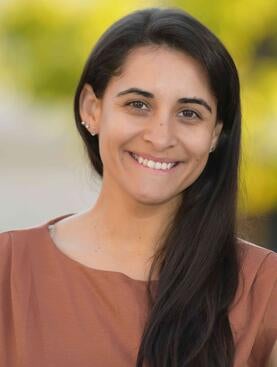
Like Delos Santos, Evelyn Guerra is another local, incoming MPH student who plans to work with her community to improve health. Although she grew up nearby in Colton, Guerra said her “Dreamer” immigration status has prevented her from qualifying for loans and pursuing her goal of becoming a doctor. For Guerra, the MPH program is a way to start making a difference in her community now while addressing health issues she’s observed throughout her life.
“For me as a young undocumented person, access to healthcare was an issue, and I really want to push for better access to care [and] getting the word out there on programs that people like me do qualify for,” Guerra said, recalling her experience with physicians who couldn’t understand her inability to obtain health insurance. Even now, Guerra said she still experiences barriers trying to access medical care for her son’s eye condition, which requires her to drive two hours to a specialty doctor in Upland. “I hope this degree also helps me bridge that gap, [as] I feel like everyone should have the right to be healthy and have access to healthcare,” she said. “In public health…there's something bigger that needs to happen and I hope I'm part of that solution.”
Moazzum Bajwa, MD, MPH, associate clinical professor of health sciences and director of the Longitudinal Ambulatory Care Experience (LACE), agreed with Sims and Guerra on the need for cooperative community efforts. “A collaborative community-based approach between clinicians and public health professionals is essential to addressing current and emerging threats and health disparities in the Inland Empire through research, policy, and advocacy,” Bajwa said. “We need to develop and maintain experts in public health who intimately understand the needs of our Inland Empire communities, and the MPH program is one of several pathways to do that.”
Diverse faculty for a unique program
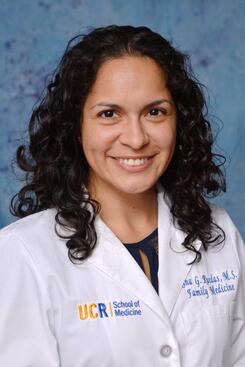
Bajwa noted the program’s diverse faculty representing 15 departments across five colleges at UCR, offering expertise and resources from across campus. “The students who apply to the MPH program at UCR SOM will build their public health foundations alongside an amazing group of faculty mentors…[who are] the most inspiring people I’ve met during my time at UCR,” Bajwa said, noting that the faculty members conduct local community-based research and programs. “Our graduates will develop innovative public health approaches to address health disparities in our medically-underserved region.”
The unique program faculty served as a draw for incoming MPH student Nina Ruedas, LMFT, director of the Women’s Resource Center at UCR. A longtime sexual health educator who has worked at UCR since 2016 and specializes in sex therapy, Ruedas shared her anticipation about working with Brandon Brown, PhD, MPH, a professor in the Department of Social Medicine, Population, and Public Health (SMPPH) who has conducted community-based HIV research.
“I'm looking forward to tackling topics that might be uncomfortable for some people and discouraged in other places,” said Ruedas, who frequently works with LGBTQ+ populations. Eventually, Ruedas said, she hopes her experience in the MPH program will help lead to her writing a book on sexual health for college students, in addition to further developing her skills as a coach and mentor. “I'm going to build a vocabulary and an understanding that can help me…teach others about these topics in new and improved ways,” she explained.
Looking to the future
SOM faculty and staff expressed as much excitement about the incoming class as the new MPH students did about the program.
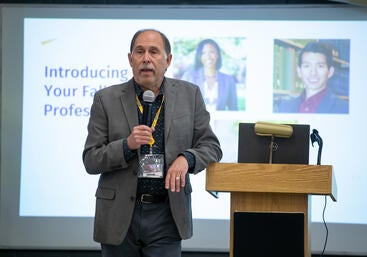
“Meeting this amazing group of students at orientation at the end of August was very gratifying for all of the faculty and staff who helped build the program over the past few years,” noted Mark Wolfson, PhD, chair of SMPPH. “The UCR MPH program has been a long time coming,” he continued. “It is an honor to support the education and professional development of the next generation of public health leaders.”
“The personal statements in the applications highlighted how each student brings different lived experiences and has unique strengths that will enrich both the learning experience and our program,” added Cristina Gonzalez, a project manager in SMPPH. “Their strong commitment to promoting community health equity is evident in each interaction that I’ve had with them.”
There was also a clear desire to support the students. Deborah Deas, MD, MPH, the vice chancellor for health sciences and the Mark and Pam Rubin dean of the School of Medicine, approved the SOM Dean’s MPH Scholarship for the inaugural class. Each of the 15 students will receive a total of $5,050, which will be distributed over the course of their first year.
For Delos Santos, earning an MPH presents an opportunity to continue pursuing his dedication to local health while improving the situation for young people growing up like he did. “I do have a lot of negative experiences as a Latino gay male growing up in Riverside, and I think that's also what sparked me staying here, because I knew that I would be able to help and expand the resources for folks who look like me,” he said. “That's a big motivation for why I stay in the region is trying to create a space like TruEvolution that I wished Jorge from 2000 was able to access.”
Delos Santos encouraged others to apply to UCR, noting the MPH program’s holistic application approach. “I would encourage folks to just apply and don't forget that lived experience,” Delos Santos said. “Your experience organizing, your experience being part of leadership positions, your experience of just existing in this space, can make you subject matter experts that can, down the line, help these master's programs become more diverse, and focus on what they want to give this local region."
